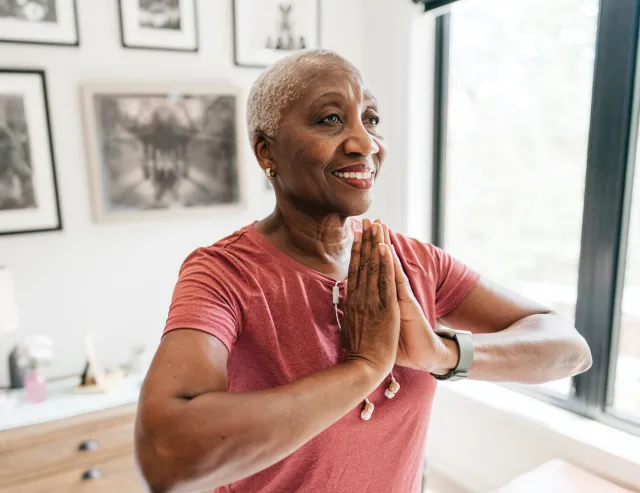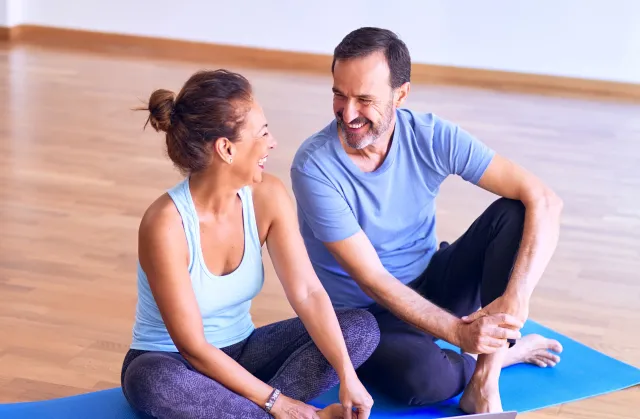Managing Stress from Cancer
Table of Contents

Feeling stressed? You are not alone.
Stress and anxiety go hand-in-hand with a cancer diagnosis. Moreover, just because your active treatment has ended doesn’t mean the stress and anxiety will as well. You may worry about whether the treatment really worked. Or your cancer treatments may have brought changes to your body that you need to adapt to.
46% of participants are experiencing significant levels of anxious thinking related to managing the cost of their cancer care.
You want to get back to normal, and you may wonder if you will ever feel the same as you did before cancer. Yet, you may need to put your “old” normal behind and adjust to a “new normal.”
You may also find that having been diagnosed with cancer changes how you think about what is important in life. You may decide to spend more time with family or friends or make time to do something you had put off. You may decide to volunteer for an organization doing good work. You may decide to leave a troubled marriage, go back to school, or look for a new job. Or you may decide to participate more in activities that you feel give your life joy and meaning.
The ways people deal with emotions are often referred to as coping mechanisms. Every person uses different ways to manage stress from cancer, depression, worry, or other negative emotions. Your cancer diagnosis and treatment may have led you to realize your coping mechanisms weren’t working very well. Or you may have found your original coping style helped you manage quite well.
Typically, people approach problems in 1 of 2 ways: actively working on them or avoiding them. In general, active coping works better and is healthier.
How to Handle Stress
Active Ways to Manage & Cope With Stress From Cancer
It’s tempting to want to avoid talking about addressing problems. Yet not talking about a problem will not make it go away. In general, it’s much better to actively address the problem. Here’s the difference:
Active Ways to Cope
- Take action to get rid of the problem.
- Plan how to deal with the problem.
- Look for advice and information to deal with the problem.
- Look for sympathy and emotional support.
- Accept that the problem exists and decide what you can and cannot control.
- Try to get a new perspective by making the best of the situation.
- Become aware of your feelings about the problem and express them to others.
Using Avoidance to Cope
- Deny that the problem exists
- Withdraw from social experience
- Avoid any thoughts about the problem
- Wishful thinking
- Use drugs or alcohol to forget the problem
- Blame and criticize yourself for the problem
- Keep extra busy and ignore the problem
When people don’t talk about their feelings, they may act on those feeling in ways they regret later, with hostile, impulsive, or irresponsible behaviors. However, it is important not to confuse restraining behavior with suppressing your feelings. Awareness of your own feelings is important for better mental health.
For example: If you fear that your partner will be turned off by your breast reconstruction or your colostomy bag, you may avoid getting into a sexual situation, or you may even pick a fight to make sure your partner will not be interested in sex. It would be much better if you could find a quiet time and ask to have a talk for a few minutes. Tell your partner your worry and let your partner respond. Talk about how to make sex feel safe and comfortable for both of you.
To find healthy ways to deal with the normal stressful feelings that accompany treatment, you must:
- Learn about the common feelings that many cancer survivors experience after treatment
- Recognize when you need more support with emotional issues
- Know where to get support and how to move forward

Grounded Yoga
This yoga practice will bring awareness to your roots by flowing through grounded postures that foster flexibility.

Frankly Speaking About Cancer Library
LibraryWould you like a print copy of these educational materials?
We can mail our Frankly Speaking About Cancer pieces to you. Shipping is free for up to 20 pounds.